Unit 6 When was it invented? SectionA Grammar Focus-4c 课件(共29张PPT)
文档属性
| 名称 | Unit 6 When was it invented? SectionA Grammar Focus-4c 课件(共29张PPT) | 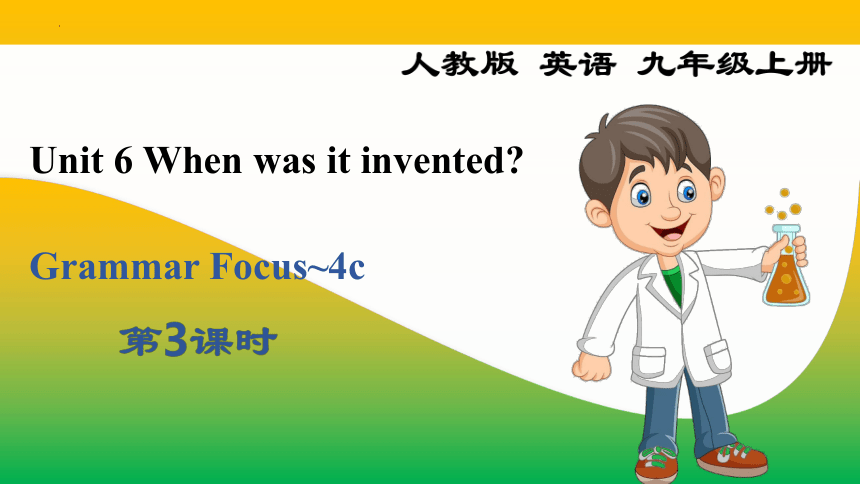 | |
| 格式 | zip | ||
| 文件大小 | 3.2MB | ||
| 资源类型 | 教案 | ||
| 版本资源 | 人教新目标(Go for it)版 | ||
| 科目 | 英语 | ||
| 更新时间 | 2022-09-02 12:07:28 | ||
图片预览

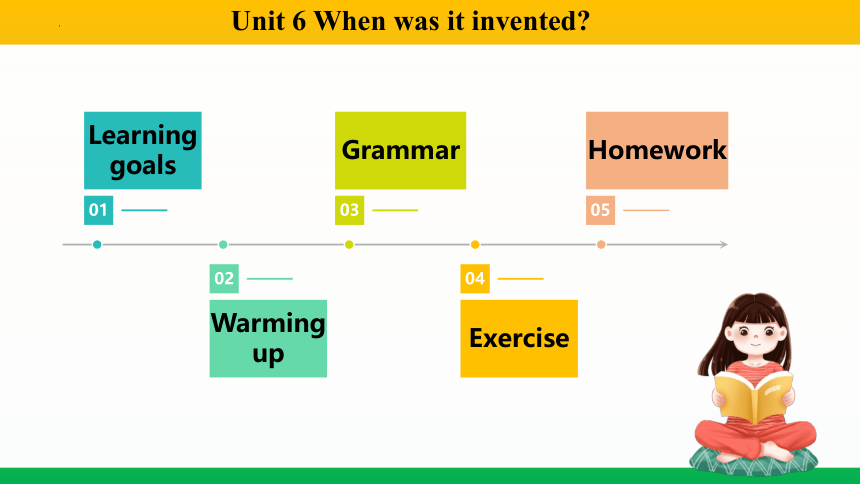
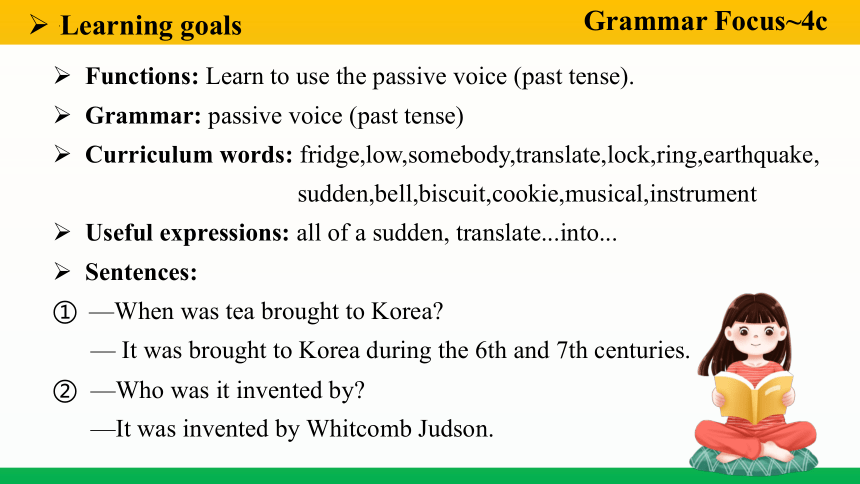
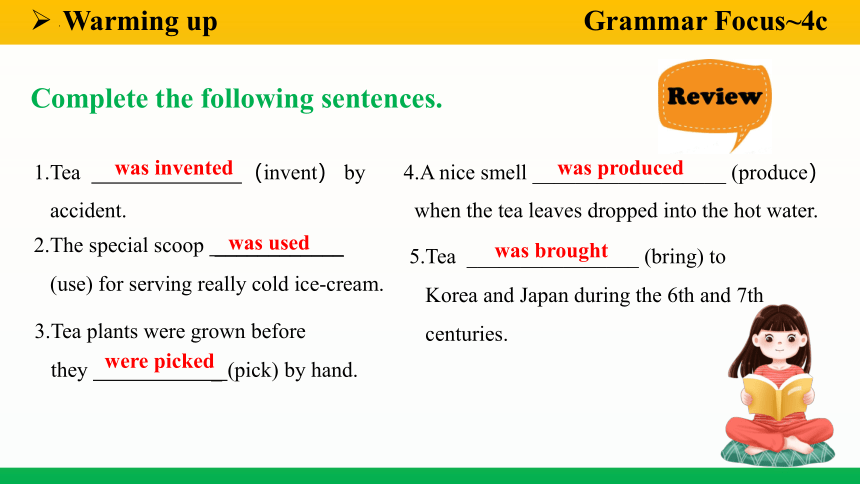
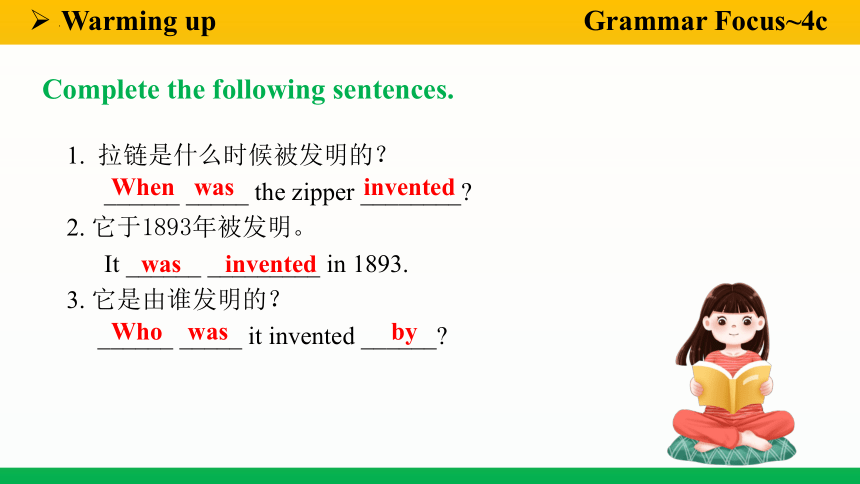
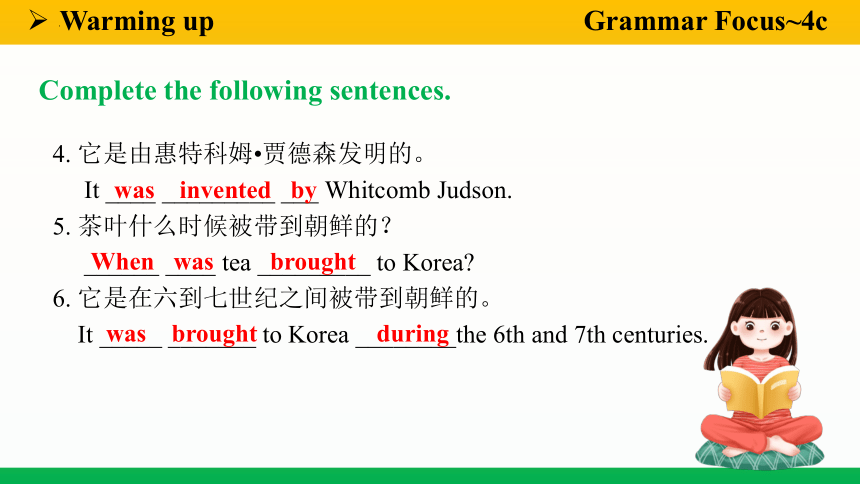
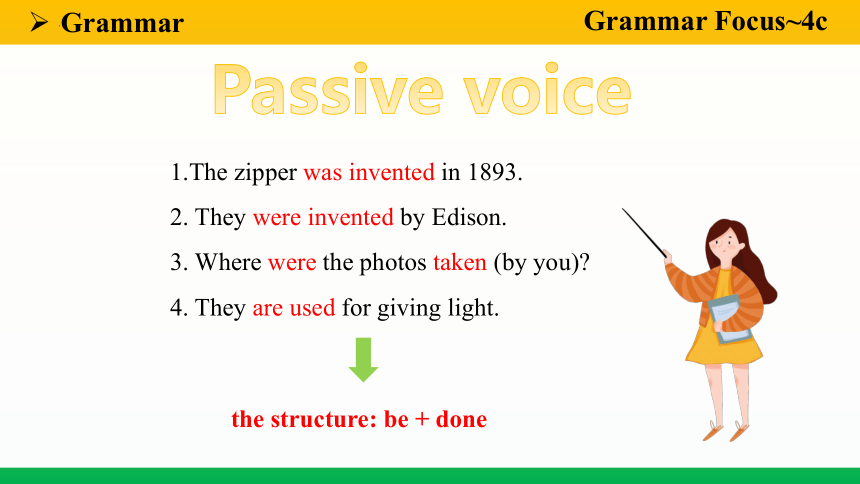
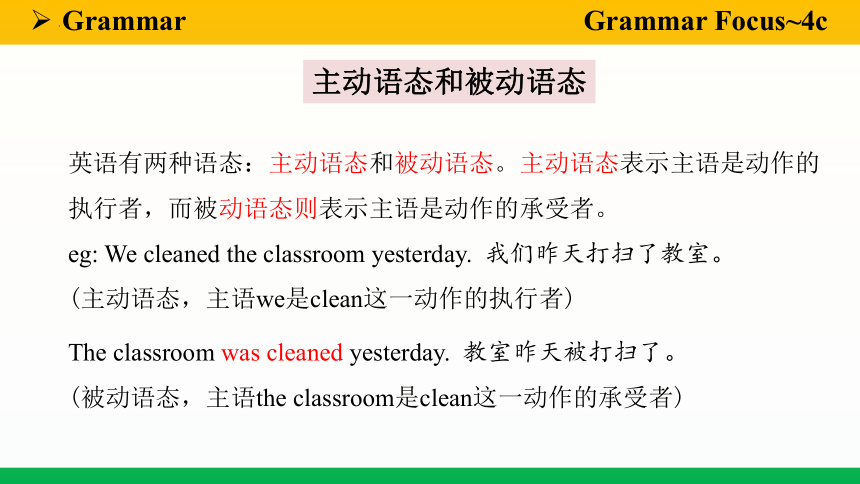
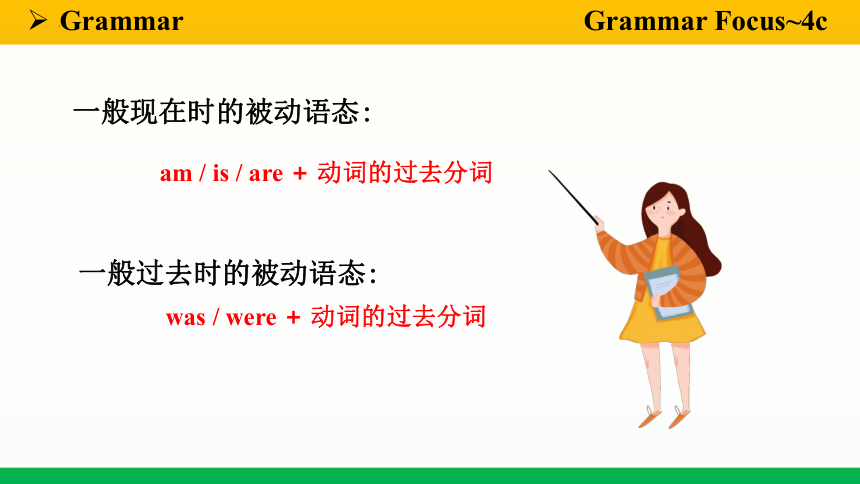
文档简介
(共29张PPT)
Grammar Focus~4c
Unit 6 When was it invented
Unit 6 When was it invented
01
Learning
goals
03
Grammar
05
Homework
02
Warming
up
04
Exercise
Learning goals
Functions: Learn to use the passive voice (past tense).
Grammar: passive voice (past tense)
Curriculum words: fridge,low,somebody,translate,lock,ring,earthquake,
sudden,bell,biscuit,cookie,musical,instrument
Useful expressions: all of a sudden, translate...into...
Sentences:
—When was tea brought to Korea
— It was brought to Korea during the 6th and 7th centuries.
② —Who was it invented by
—It was invented by Whitcomb Judson.
Warming up
1.Tea (invent) by
accident.
5.Tea ________________ (bring) to
Korea and Japan during the 6th and 7th
centuries.
2.The special scoop ____________
(use) for serving really cold ice-cream.
3.Tea plants were grown before
they _ (pick) by hand.
4.A nice smell __________________ (produce)when the tea leaves dropped into the hot water.
was invented
was brought
was used
were picked
was produced
Complete the following sentences.
Complete the following sentences.
1. 拉链是什么时候被发明的?
______ _____ the zipper ________
2. 它于1893年被发明。
It ______ _________ in 1893.
3. 它是由谁发明的?
______ _____ it invented ______
was invented
When was invented
Who was by
Warming up
Complete the following sentences.
4. 它是由惠特科姆 贾德森发明的。
It ____ _________ ___ Whitcomb Judson.
5. 茶叶什么时候被带到朝鲜的?
______ ____ tea _________ to Korea
6. 它是在六到七世纪之间被带到朝鲜的。
It _____ _______ to Korea ________the 6th and 7th centuries.
was invented by
When was brought
was brought during
Warming up
Grammar
1.The zipper was invented in 1893.
2. They were invented by Edison.
3. Where were the photos taken (by you)
4. They are used for giving light.
the structure: be + done
Passive voice
英语有两种语态:主动语态和被动语态。主动语态表示主语是动作的执行者,而被动语态则表示主语是动作的承受者。
eg: We cleaned the classroom yesterday. 我们昨天打扫了教室。
(主动语态,主语we是clean这一动作的执行者)
The classroom was cleaned yesterday. 教室昨天被打扫了。
(被动语态,主语the classroom是clean这一动作的承受者)
主动语态和被动语态
Grammar
一般现在时的被动语态:
am / is / are + 动词的过去分词
一般过去时的被动语态:
was / were + 动词的过去分词
Grammar
1. 肯定句 主语 + was/were + 过去分词 + (by…)
A sweet song was sung by her on the stage.
2. 否定句 主语 + was/were + not +过去分词 + (by…)
3.一般疑问句 Was/Were + 主语 +过去分词 + (by…)
A sweet song wasn’t sung by her on the stage.
Was a sweet song sung by her on the stage
4.特殊疑问句 疑问词 + was/were + 主语 +过去分词 + (by…)
Where was a sweet song sung by her
一般过去时的被动语态
Grammar
When was the zipper invented It was invented in 1893.
Who was it invented by It was invented by Whitcomb Judson.
When was tea brought to Korea It was brought to Korea during the 6th and 7th centuries.
What is the hot ice-cream scoop used for It’s used for serving really cold ice-cream.
Active Voice : Alexander Graham Bell invented the telephone in 1876. Passive Voice: The telephone was invented (by Alexander Graham Bell) in 1876.
Grammar Focus
Grammar
Active Voice 主动语态 _____________________invented _____________ in 1876.
Passive Voice 被动语态 The telephone was invented (by Alexander Graham Bell) in 1876.
Alexander Graham Bell
the telephone
Grammar
主动句变为被动句所遵循的4个步骤:
1. 把原主动句中的宾语变为被
动句的主语。
2. 把动词变为被动形式,即be+
过去分词,并注意其人称和
数随主语的变化,而动词的
时态则保持不变。
3. 原主动句的主语如需要则放
在by后面以它的宾格形式出
现(注意代词的宾格),如
不需要则可省略。
4. 其它的成分(定语、状语)
不变。
口诀:
主宾互换格要变
谓语变化时态定
by加被动宾语前
其他一律都不变
Grammar
①含有双宾语的主动句变为被动语态时,通常把
指 “人”的间接宾语变为主语,而指“物”
的直接宾语则不变。
He gave me a book yesterday.
→I was given a book (by him) yesterday.
②如果要把指“物”的直接宾语变为主语,则在
间接宾语前加to或for。
I brought him some food.
→Some food was brought to him (by me).
Grammar
③含有复合宾语的主动句变为被动语态时,要将
其中的宾语变成主语,宾语补足语不变。
Jim asked Tom to go for a walk.
→Tom was asked (by Jim) to go for a walk.
④如果宾语补足语是不带to的动词不定式,主
动语态变成被动语态时要加上不定式符号to。
We often heard Kate sing in the room.
→Kate was often heard to sing in the room (by us).
Grammar
4a
Rewrite the sentences using the passive voice.
They sold the fridge at a low price.
2. Somebody stole my camera from my hotel room.
3. Where did you take these photos
The fridge was sold at a low price.
My camera was stolen (by somebody) from my hotel room.
Where were these photos taken (by you)
adj. 低的;矮的
n. 冰箱
pron. 某人
n.重要人物
Grammar
Rewrite the sentences using the passive voice.
4. Our parents advised us not to go out alone.
5. Different writers translated the book into different
languages.
We were advised not to go out alone by our parents.
The book was translated into different languages by different writers.
v. 翻译
Grammar
4a
Complete the sentences with the correct forms of the verbs in the box.
eat lock like ring invite break tell bring
1. You _____________ to the party last night, weren’t
you Why didn’t you go
2. The earthquake happened all of a sudden, but luckily
the villagers _____________ to a safe place.
were invited
were brought
v. (使)发出钟声或铃声;打电话
v. 锁上;锁住 n. 锁
n. 地震
突然;猛地
Grammar
4b
Complete the sentences with the correct forms of the verbs in the box.
3. The door ___________ when we arrived, so we
______ the bell.
4. The students ________ not to eat or drink in class,
but Ruby _______ the rule when she started eating
a biscuit in science class.
5. The cookies _________ by the hungry kids in less
than 20 minutes, and they really _____ them.
was locked
rang
were told
broke
were eaten
liked
n. 钟(声);铃(声)
n. 曲奇饼
n. 饼干
Grammar
4b
Decide whether active or passive forms should be used in these sentences. Write the correct forms in the blanks.
The telephone _____________ (invent) by Alexander Graham Bell. He __________ (born) in 1847. Mr. Bell ________ (work) on the invention of the telephone with Thomas Watson. In 1875, Mr. Bell _______ (learn) how to send musical notes through an
was invented
was born
worked
learned
adj. 音乐的
Grammar
4c
Decide whether active or passive forms should be used in these sentences. Write the correct forms in the blanks.
instrument similar to a telephone. Finally, the telephone ____________ (invent) in 1876. The first sentence that ________ (say) on the telephone by Mr. Bell was “Mr. Watson, come here; I want to see you.” Today the telephone ________ (use) around the world.
was invented
was said
is used
n. 器械;仪器;工具
Grammar
4c
1.Different writers translated the book into different languages.(教材P44 4a)
Language points
translate v. 翻译
Point
相关短语:translate...into... 把……翻译成……
eg: Journey to the West is a traditional Chinese book. It has been translated into different languages.《西游记》是一本传统的中国书。它已经被译成了各种不同的语言。
translation n. 翻译
translator n. 翻译家,译者
Grammar
2.The door was locked when we arrived, so we rang the bell.(教材P44 4b)
Language points
ring v. (使)发出铃声或钟声;打电话 n. 戒指
Point
ring作动词,意为“(使)发出铃声或钟声;打电话”。其过去式和过去分词分别为rang和rung。
ring (sb. )up (给某人)打电话
eg:John rang up and invited us for dinner.
约翰打电话邀请我们共进晚餐。
ring作名词,意为“戒指”。
eg: Mrs. Liu wears a ring. 刘太太戴着戒指。
Grammar
Exercise
一、用括号内所给单词的适当形式填空。
1. The bridge over the river ( finish) three years ago.
2. A present ( give) to me by my friend on my birthday
3. He (see) to swim in Daming Lake yesterday.
4. Annie (invite) to the party. She had a wonderful time
with us.
5. The book ( translate ) into many other languages
last year.
was finished
was given
was seen
was invited
was translated
二、单项选择。
1. Gina went to the doctor’s yesterday and about the importance of
good living habits once more.
A. was told B. is told
C. are told D. has told
2. Look at the flowers on both sides of the street. They last
month.
A. are planted B. were planted
C. are planting D. were planting
Exercise
A
B
3.To celebrate the100th birthday of the Communist Party of China, a speech
competition in our school last week.
A. hold B. held
C. is held D. was held
4. “I’m still working because I’m still capable and hope to guide more
young people,” said Wu Mengchao when he .
A. is interviewed B. is interviewing
C. was interviewed D. was interviewing
5. These gifts by children in their last summer holidays.
A. made B. were made
C. make D. are made
Exercise
D
C
B
1. (2021湖北黄冈)—Eric, you to go to the teachers’office just now. What’s up
—We aren’t allowed to bring phones to school. Em, but I broke the rule.
A. told B. tell
C. are told D. were told
2. (2021湖北武汉)—Did you notice the students a few why questions in Mr.
Zhang’s class
—Yes, I think he wanted to train their abilities to deep thinking.
A. are asked B. must be asked
C. have been asked D. were asked
Exercise
Homework
Review the passive voice.
Finish the exercises in the workbook.
Memorize the language points.
Unit 6 When was it invented
Thank You
Grammar Focus~4c
Unit 6 When was it invented
Unit 6 When was it invented
01
Learning
goals
03
Grammar
05
Homework
02
Warming
up
04
Exercise
Learning goals
Functions: Learn to use the passive voice (past tense).
Grammar: passive voice (past tense)
Curriculum words: fridge,low,somebody,translate,lock,ring,earthquake,
sudden,bell,biscuit,cookie,musical,instrument
Useful expressions: all of a sudden, translate...into...
Sentences:
—When was tea brought to Korea
— It was brought to Korea during the 6th and 7th centuries.
② —Who was it invented by
—It was invented by Whitcomb Judson.
Warming up
1.Tea (invent) by
accident.
5.Tea ________________ (bring) to
Korea and Japan during the 6th and 7th
centuries.
2.The special scoop ____________
(use) for serving really cold ice-cream.
3.Tea plants were grown before
they _ (pick) by hand.
4.A nice smell __________________ (produce)when the tea leaves dropped into the hot water.
was invented
was brought
was used
were picked
was produced
Complete the following sentences.
Complete the following sentences.
1. 拉链是什么时候被发明的?
______ _____ the zipper ________
2. 它于1893年被发明。
It ______ _________ in 1893.
3. 它是由谁发明的?
______ _____ it invented ______
was invented
When was invented
Who was by
Warming up
Complete the following sentences.
4. 它是由惠特科姆 贾德森发明的。
It ____ _________ ___ Whitcomb Judson.
5. 茶叶什么时候被带到朝鲜的?
______ ____ tea _________ to Korea
6. 它是在六到七世纪之间被带到朝鲜的。
It _____ _______ to Korea ________the 6th and 7th centuries.
was invented by
When was brought
was brought during
Warming up
Grammar
1.The zipper was invented in 1893.
2. They were invented by Edison.
3. Where were the photos taken (by you)
4. They are used for giving light.
the structure: be + done
Passive voice
英语有两种语态:主动语态和被动语态。主动语态表示主语是动作的执行者,而被动语态则表示主语是动作的承受者。
eg: We cleaned the classroom yesterday. 我们昨天打扫了教室。
(主动语态,主语we是clean这一动作的执行者)
The classroom was cleaned yesterday. 教室昨天被打扫了。
(被动语态,主语the classroom是clean这一动作的承受者)
主动语态和被动语态
Grammar
一般现在时的被动语态:
am / is / are + 动词的过去分词
一般过去时的被动语态:
was / were + 动词的过去分词
Grammar
1. 肯定句 主语 + was/were + 过去分词 + (by…)
A sweet song was sung by her on the stage.
2. 否定句 主语 + was/were + not +过去分词 + (by…)
3.一般疑问句 Was/Were + 主语 +过去分词 + (by…)
A sweet song wasn’t sung by her on the stage.
Was a sweet song sung by her on the stage
4.特殊疑问句 疑问词 + was/were + 主语 +过去分词 + (by…)
Where was a sweet song sung by her
一般过去时的被动语态
Grammar
When was the zipper invented It was invented in 1893.
Who was it invented by It was invented by Whitcomb Judson.
When was tea brought to Korea It was brought to Korea during the 6th and 7th centuries.
What is the hot ice-cream scoop used for It’s used for serving really cold ice-cream.
Active Voice : Alexander Graham Bell invented the telephone in 1876. Passive Voice: The telephone was invented (by Alexander Graham Bell) in 1876.
Grammar Focus
Grammar
Active Voice 主动语态 _____________________invented _____________ in 1876.
Passive Voice 被动语态 The telephone was invented (by Alexander Graham Bell) in 1876.
Alexander Graham Bell
the telephone
Grammar
主动句变为被动句所遵循的4个步骤:
1. 把原主动句中的宾语变为被
动句的主语。
2. 把动词变为被动形式,即be+
过去分词,并注意其人称和
数随主语的变化,而动词的
时态则保持不变。
3. 原主动句的主语如需要则放
在by后面以它的宾格形式出
现(注意代词的宾格),如
不需要则可省略。
4. 其它的成分(定语、状语)
不变。
口诀:
主宾互换格要变
谓语变化时态定
by加被动宾语前
其他一律都不变
Grammar
①含有双宾语的主动句变为被动语态时,通常把
指 “人”的间接宾语变为主语,而指“物”
的直接宾语则不变。
He gave me a book yesterday.
→I was given a book (by him) yesterday.
②如果要把指“物”的直接宾语变为主语,则在
间接宾语前加to或for。
I brought him some food.
→Some food was brought to him (by me).
Grammar
③含有复合宾语的主动句变为被动语态时,要将
其中的宾语变成主语,宾语补足语不变。
Jim asked Tom to go for a walk.
→Tom was asked (by Jim) to go for a walk.
④如果宾语补足语是不带to的动词不定式,主
动语态变成被动语态时要加上不定式符号to。
We often heard Kate sing in the room.
→Kate was often heard to sing in the room (by us).
Grammar
4a
Rewrite the sentences using the passive voice.
They sold the fridge at a low price.
2. Somebody stole my camera from my hotel room.
3. Where did you take these photos
The fridge was sold at a low price.
My camera was stolen (by somebody) from my hotel room.
Where were these photos taken (by you)
adj. 低的;矮的
n. 冰箱
pron. 某人
n.重要人物
Grammar
Rewrite the sentences using the passive voice.
4. Our parents advised us not to go out alone.
5. Different writers translated the book into different
languages.
We were advised not to go out alone by our parents.
The book was translated into different languages by different writers.
v. 翻译
Grammar
4a
Complete the sentences with the correct forms of the verbs in the box.
eat lock like ring invite break tell bring
1. You _____________ to the party last night, weren’t
you Why didn’t you go
2. The earthquake happened all of a sudden, but luckily
the villagers _____________ to a safe place.
were invited
were brought
v. (使)发出钟声或铃声;打电话
v. 锁上;锁住 n. 锁
n. 地震
突然;猛地
Grammar
4b
Complete the sentences with the correct forms of the verbs in the box.
3. The door ___________ when we arrived, so we
______ the bell.
4. The students ________ not to eat or drink in class,
but Ruby _______ the rule when she started eating
a biscuit in science class.
5. The cookies _________ by the hungry kids in less
than 20 minutes, and they really _____ them.
was locked
rang
were told
broke
were eaten
liked
n. 钟(声);铃(声)
n. 曲奇饼
n. 饼干
Grammar
4b
Decide whether active or passive forms should be used in these sentences. Write the correct forms in the blanks.
The telephone _____________ (invent) by Alexander Graham Bell. He __________ (born) in 1847. Mr. Bell ________ (work) on the invention of the telephone with Thomas Watson. In 1875, Mr. Bell _______ (learn) how to send musical notes through an
was invented
was born
worked
learned
adj. 音乐的
Grammar
4c
Decide whether active or passive forms should be used in these sentences. Write the correct forms in the blanks.
instrument similar to a telephone. Finally, the telephone ____________ (invent) in 1876. The first sentence that ________ (say) on the telephone by Mr. Bell was “Mr. Watson, come here; I want to see you.” Today the telephone ________ (use) around the world.
was invented
was said
is used
n. 器械;仪器;工具
Grammar
4c
1.Different writers translated the book into different languages.(教材P44 4a)
Language points
translate v. 翻译
Point
相关短语:translate...into... 把……翻译成……
eg: Journey to the West is a traditional Chinese book. It has been translated into different languages.《西游记》是一本传统的中国书。它已经被译成了各种不同的语言。
translation n. 翻译
translator n. 翻译家,译者
Grammar
2.The door was locked when we arrived, so we rang the bell.(教材P44 4b)
Language points
ring v. (使)发出铃声或钟声;打电话 n. 戒指
Point
ring作动词,意为“(使)发出铃声或钟声;打电话”。其过去式和过去分词分别为rang和rung。
ring (sb. )up (给某人)打电话
eg:John rang up and invited us for dinner.
约翰打电话邀请我们共进晚餐。
ring作名词,意为“戒指”。
eg: Mrs. Liu wears a ring. 刘太太戴着戒指。
Grammar
Exercise
一、用括号内所给单词的适当形式填空。
1. The bridge over the river ( finish) three years ago.
2. A present ( give) to me by my friend on my birthday
3. He (see) to swim in Daming Lake yesterday.
4. Annie (invite) to the party. She had a wonderful time
with us.
5. The book ( translate ) into many other languages
last year.
was finished
was given
was seen
was invited
was translated
二、单项选择。
1. Gina went to the doctor’s yesterday and about the importance of
good living habits once more.
A. was told B. is told
C. are told D. has told
2. Look at the flowers on both sides of the street. They last
month.
A. are planted B. were planted
C. are planting D. were planting
Exercise
A
B
3.To celebrate the100th birthday of the Communist Party of China, a speech
competition in our school last week.
A. hold B. held
C. is held D. was held
4. “I’m still working because I’m still capable and hope to guide more
young people,” said Wu Mengchao when he .
A. is interviewed B. is interviewing
C. was interviewed D. was interviewing
5. These gifts by children in their last summer holidays.
A. made B. were made
C. make D. are made
Exercise
D
C
B
1. (2021湖北黄冈)—Eric, you to go to the teachers’office just now. What’s up
—We aren’t allowed to bring phones to school. Em, but I broke the rule.
A. told B. tell
C. are told D. were told
2. (2021湖北武汉)—Did you notice the students a few why questions in Mr.
Zhang’s class
—Yes, I think he wanted to train their abilities to deep thinking.
A. are asked B. must be asked
C. have been asked D. were asked
Exercise
Homework
Review the passive voice.
Finish the exercises in the workbook.
Memorize the language points.
Unit 6 When was it invented
Thank You
同课章节目录
- Unit 1 How can we become good learners.
- Section A
- Section B
- Unit 2 I think that mooncakes are delicious!
- Section A
- Section B
- Unit 3 Could you please tell me where the restroom
- Section A
- Section B
- Unit 4 I used to be afraid of the dark.
- Section A
- Section B
- Unit 5 What are the shirts made of?
- Section A
- Section B
- Review of Units 1-5
- Unit 6 When was it invented?
- Section A
- Section B
- Unit 7 Teenagers should be allowed to choose their
- Section A
- Section B
- Unit 8 It must belong to Carla.
- Section A
- Section B
- Unit 9 I like music that I can dance to.
- Section A
- Section B
- Unit 10 You're supposed to shake hands.
- Section A
- Section B
- Review of Units 6-10
- Unit 11 Sad movies make me cry.
- Section A
- Section B
- Unit 12 Life is full of the unexpected
- Section A
- Section B
- Unit 13 We're trying to save the earth!
- Section A
- Section B
- Unit 14 I remember meeting all of you in Grade 7.
- Section A
- Section B
- Review of Units 11-14
